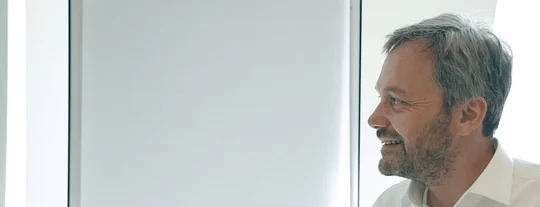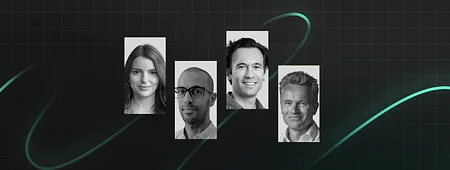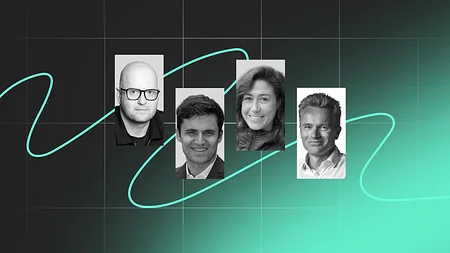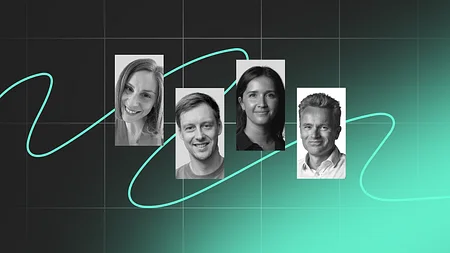Laurent le Moal - CEO, PayU on 250 ways to accept payment
Jason Bates interviews Laurent le Moal, CEO of PayU, the leading online payments provider, dedicated to growth markets, at Money20/20 Europe in Copenhagen.
I’d love to know a little bit about PayU to start with.
Think of it, as a classic payments company. Our job is just basically to help merchants accept payments. What makes it a bit different is that we operate, in a lot of very exotic countries like India, like Africa like Latin America, Central/Eastern Europe, Russia, Turkey. All countries where there is a lot of growth for e-commerce. A lot of countries where people pay with Visa and MasterCard, but not just with Visa and MasterCard, with a lot of funky products that only they know, but that account for one in two transactions. Our job is to do that.
I saw on one of your websites, that you took something like 100 different ways of payment or something?
Yes, 250, actually.
250?
250.
Before PayU, I spent a lot of time with big American companies in payments, and [it seems that] payment is global. It’s absolutely not true. It’s not even becoming global, it’s becoming even more fragmented, for two reasons. The first one is what is called alternative payment methods. As I say, it’s not alternative, it’s one in two transactions. The second thing is, people want to have better control of how they spend their money, how they get their money. So, you need to be able to have all these local payment means. If you’re a big global merchant, at the end of the day, what you want is higher conversion, so for that you need to have all the connections with the local banks, and you need just to give consumers what they want. So, the 250 payment means is what will bring you your next 1 billion people.
Wow. I’m not sure I could even list 30 different payment means. How do they categorise down?
To make it simple you have to ask, “What are the true big networks and platforms?” So, you have the card platforms, the big global ones. There’s only a few, like Visa and MasterCard and so on. But then you have all the regional or local schemes. Every big country will want to have control over their own local schemes. This is what you see in India, with UPI. The stuff that took many years in the UK, like faster payments, they got it up and running in 18 months. That’s quite unique.
So you have the local schemes, and that’s a matter of sovereignty, for any big country. Then you will have all the bank based account payments. Then you will have all the legacy payment systems, mostly based on cash, for instance. But at the end of the day, you still want to bridge the gap between cash and electronic money, and there are multiple ways to do that. M-Pesa is a fantastic way to do it. But every country will have its own version of that. So, if you put all of that together, you get to 250.
Every big country will want to have control over their own local schemes. If you put all of that together, you get to 250.Is it going to go down? I’m not sure. Actually, I think it could increase. The question is, if you are in the payments business, how can you aggregate that, and how can you simplify that for the big merchants? They want the best of both worlds: “I want all the payment methods, but can you just give me one API?” That’s what we do. Do you focus on e-commerce and online business? We focus on digital transactions. If I take India, for instance, that’s one of our biggest markets. In India, if you take all the ecommerce transactions, we basically process 60% of them. 75% of that is only mobile, that’s it. It should be even higher than that. We only focus on digital. When we look at the growth of ecommerce, physical goods is just a small part. The biggest part is all digital goods, it’s all services, it’s all the subscriptions, it’s all the games, it’s all the services that you consume around the world, that are global by essence. So, I think we are in a good spot, because we are in these markets where there's lot of growth, and we’re just trying to simplify all of that. It seems like you’re uniquely positioned, having a big market share in a great market. What are the key themes, or the things that you’re seeing develop at the moment? Payments is a fantastic business, we are in all of these key markets. We have a payments business. But truly, what does it give you, payments? I think it gives you two things. Transactional data, which is very valuable, and the second thing is we have a merchant distribution network. This little checkout page, on your mobile, it’s a very valuable piece of real estate. You can push products through that. So, the whole strategy of what we are doing right now is leveraging our payments business to move into financial services. Because in a lot of these markets, access to credit is still a big, big pain for consumers, and therefore also a big need for merchants, because that’s the way for them to increase their sales. So, the big move we’ve made was to start building our own product for consumer credit, in different shapes, like a pay later type of product, we have launched a product in India called LazyPay, meaning, in just one click, you buy, and you will pay later. And the whole premise of that is: "I already know enough about you that I can afford to take the risk and get the money later." We are starting to build our products around this, to serve these consumers. The key realisation for us was the only thing that truly you need to have is a credit scoring engine. And that’s how we started to work with a company called Kreditech.
The whole strategy of what we are doing right now is leveraging our payments business to move into financial services.We worked together, we built a product, we launched it, it worked very well, so then we decided to invest, we put $120 million on the table, as an investment with them, and said, “With that money, we’re going to help you come to India and make it big there.” What you’re looking for is a non-traditional credit scoring. It’s very much more behavioural scoring and a variety of other algorithms. Yes. Well, you need to invest new models, right? In India, of course people, have credit cards, but it’s 1% of the population. It’s the people who actually don’t need credit in the first place. And that’s because the model is still basically the same. Here, you’re just starting from all the data that is available, and just having your mobile data, you can leverage that to reconstruct, the whole financial profile of a consumer, and suddenly, you’ve got something valuable. The data is there. If you have the right credit scoring, and the right people, which is a mix of the technology of someone like Kreditech, but let’s have also the local expertise of people who truly understand how it works in India, that’s what we provide. It’s super exciting. It reminds me a little of Klarna, just having applied for their banking licence. Again, coming from that point of sale lending and data. Yes. That’s the sense of history, to get a banking licence; In the UK, some people start with that. In other countries, other people end with that. Exactly. We talk to a lot of fintechs where the unit economics just don’t work. They’re building scale so eventually they can pivot round to something that makes money. Whereas what fascinates me about what you’re doing, and what Klarna’s doing, is you’re actually starting from a great, viable business, one that actually is not only viable in terms of revenue, but in terms of the amount of data that you’re collecting, and the customers, and then turning that, or exploring how that turns into more general, financial services. We will get into banking. That’s for sure. But the starting point is very different. For us, it’s a payments franchise moving into consumer credit, first, and we started with the consumer, which is much more difficult, in a way. We started with that also because it makes your whole payments business much more attractive, and differentiated. We are moving into, also, merchant financing. But yes, you’re right, these are services where the economics can be also challenging, at the end of the day, you better be sure you know how to manage risk.
We will get into banking. That’s for sure. But the starting point is very different...we started with the consumerYou’d better be sure you know how to manage your own balance sheet exposure, or how to leverage other people’s balance sheets. But we believe that once you’ve really mastered that, then you truly have a good business that then, if you want to go into consumer banking, and deposits, it’s just an extension of that offer. It’s a new way to distribute your product. Do we want to control everything? Do we want to do everything? Absolutely not. We’d rather also partner again. I take India [as an example], but I could take also Latin America there’s a lot of wallet providers. Fantastic. Let them do their job, acquiring consumers, pushing offers, loyalty programmes, whatever they want. You can still be, the partner of choice for the financial services, products they will distribute. Latin America, also very interesting, especially when you go to a market like Brazil, where, I think it’s the market where the banks are the most greedy in the world. It doesn’t mean that you can just go there with the mobile app, and consumers will flock, you know, to your franchise. There’s still some work to do there. At the end of the day, you don’t disrupt anything when you have only 100,000 customers, right? No. So, how do we scale that? I think we are all still struggling a bit with this. We’re here at Money 2020 in Copenhagen, what are you here for? What are you looking for? I am here just to meet a lot of people that I never have the opportunity to meet. I think it’s good now that the fintech hype is a bit slowing down in Europe. You start seeing the ones that are truly emerging as the leaders, and now we’re going to be serious in terms of being an investor, as well. Where is the growth capital coming from?
I think you need to look east, actually. This is where the money is.I guess we just see it cross the pond, don’t we? To New York, east coast, west coast, generally that’s the approach of, you get your seed in London, maybe something in Berlin, and cross the water. Do you think that will change? I think you need to look east, actually. This is where the money is. This is where you have deep pocket investors, that are truly looking at new models in Europe, that are willing to invest, to scale the businesses. Jason Bates was chatting to Laurent le Moal at Money20/20 Europe, Copenhagen. To listen to the interview in full, download the episode of Fintech Insider.





